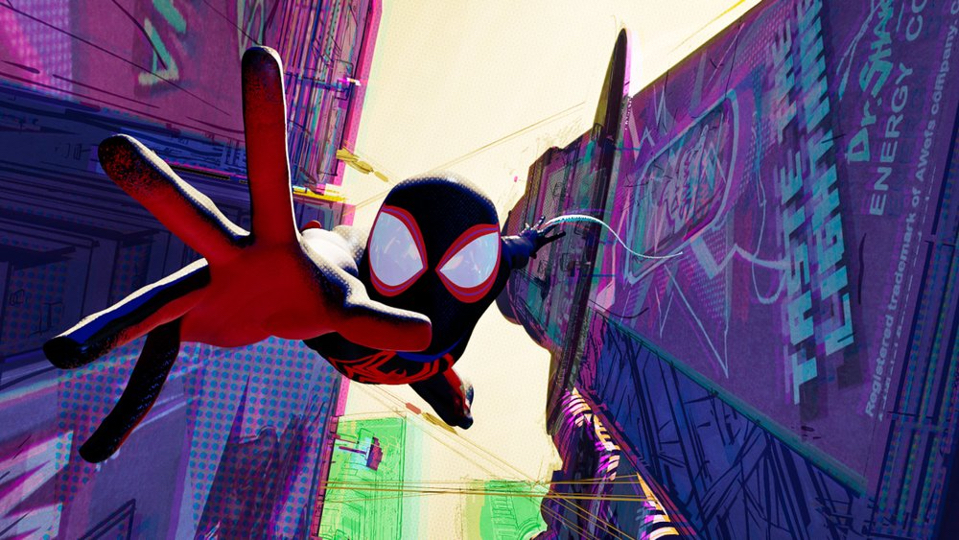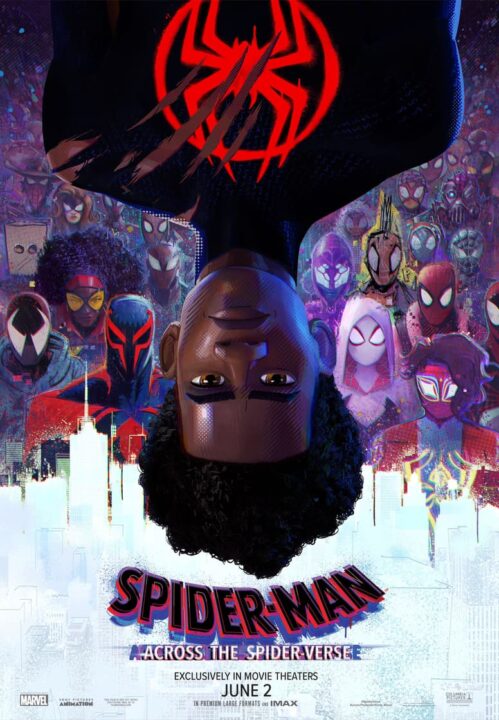Spider-Man: Across the Spider-Verse is an incredible, mind-blowing work of art that is also one of the best films of the year. The film dives even deeper into the concept of the multi-verse(s), and its spectacularly animated sequences reach dizzying new heights in this sequel to 2018’s Into the Spider-Verse, which won the Oscar for Best Animated Feature Film.
The story continues with Miles Morales (Shameik Moore) as he continues to figure out his life as New York’s newest Spidey. Zipping through cityscapes with the greatest of ease, his biggest struggle is balancing his teenage life: honoring his commitments to his mother (Luna Lauren Vélez) and soon-to-be-police chief father (Brian Tyree Henry), looking ahead to college and oh yeah, trying to save the world–all while keeping his identity a secret from those he loves.
The only ones who know Miles’ true identity are the league of Spider-Men who helped teach him the ropes (webs?) after crash-landing into his universe in the previous film. All of the Spider-Men, including punky introvert Gwen Stacy (Hailee Steinfeld), are spread across different worlds.
The film opens with Gwen’s origin story shown over an incredible drum-solo montage that also illustrates each world’s specific visual style (Gwen’s is a watercolor one, while Miles’ ink-blotted world more readily resembles comics). After Gwen is attacked in her world by the universe-hopping villain Vulture (Jorma Taccone), she also unexpectedly meets a few more Spider-Men and women (Oscar Isaac as Spider-Man 2099 and Issa Rae). These heroes are part of a “Spider-Society” that protects the multi-verses from “canon disruptions.” Wishing to leave her world behind, she pleads to join theirs. Against better judgment, she decides to pop over to Miles’ world for a quick visit.
While Miles has matured since the first film, although still wise-cracking and perhaps a bit too cocky in his Spidey role, he underestimates the arrival of a clumsy new villain, Spot (Jason Schwartzman). Spot warns Miles that he is his new nemesis and holds him responsible for his genetic mutation; being covered in spots that he can use to travel through space (a result of the first film’s universe collider).
A surprise visit from Gwen excites Miles, and the two web-sling around the city in friendly flirtatious fun. But when he sneakily follows her and her Spidey task force into a new universe (we travel to many in the film; buckle up) and disrupts a key moment in that world, he learns of an unintended truth that the Spider-Men share: some events, while tragic, are fated to happen and keep all of the universes connected and in order. Miles learns that he can’t save everyone, a truth he struggles to accept and ultimately, doesn’t.
Written by Phil Lord, Chris Miller, and Dave Callaham, Across the Spider-Verse takes Miles’ story into even larger worlds and consequences. Directors Joaquim Dos Santos, Kemp Powers, and Justin K. Thompson’s film explodes with dizzyingly brilliant animation that constantly feels like you’re trying to hang on to a mechanical bull. With a runtime of 2 hours and 20 minutes, this is the longest American animated film to date. Across the Spider-Verse also claims to have the largest crew of any animated movie ever, with around 1,000 people working on it. It has 240 characters and takes place in six universes.
And yet, while it’s the most wow-worthy and spectacular thing I’ve seen this year so far, it fails to capture the same heart as its predecessor Into the Spider-Verse did. Likely, there is too much going on. The first film was more self-contained, in that all of the action crash-landed into Miles’s world. By the time we’ve jumped into our sixth universe, you do feel a sense of endless abandon that makes it difficult to remain emotionally connected to the looming threat lurking back in Miles’s world.
Beyond the astounding animation, the vocal performances remain perfect and excellently cast. Shameik Moore returns as Miles, expressing the same boyish gusto with a bit more frustration and angst to color his world. Hailee Steinfeld as Gwen is given even more spotlight to express her story, which is the most heartfelt part of the film. Newcomers Oscar Isaac and Issa Rae are wonderful inclusions here too. Isaac specifically lends a bottled rage that turns troubling when we learn that his Spider-Man isn’t exactly in Miles’ corner.
Further shouts go to Daniel Kaluuya as Spider-Punk and Karan Soni as Indian Spider-Man Pavitr Prabhakar. And beyond all of the web-slingers, Miles’s loving parents played by Brian Tyree Henry and Luna Lauren Vélez give the world a grounded, heartfelt center for Miles’s story.
Spider-Man: Across the Spider-Verse is an incredible work of art that bursts with fun and visual wonder that proves the sequel game can remain strong (Beyond the Spider-Verse will return in March 2024).
2h 20 minutes. Rated PG for sequences of animated action violence, some language, and thematic elements.
Ryan Rojas
Ryan is the editorial manager of Cinemacy, which he co-runs with his older sister, Morgan. Ryan is a member of the Hollywood Critics Association. Ryan's favorite films include 2001: A Space Odyssey, The Social Network, and The Master.


